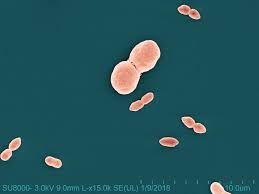The underlying factors contributing to the common condition of atopic dermatitis, more commonly referred to as eczema, are generally related to an imbalance in the skin microbiome. The skin is home to an abundance of different species of bacteria, and most are symbiotic with humans and provide many defenses against invading pathogens. One of these symbiotic bacteria is called Roseomonas Mucosa (R. Mucosa), and it is this bacteria that has been found to be essential to maintaining a well-balanced and healthy skin microbiome, which in turn protects us from invaders such as Staphylococcus Aureus, the primary cause of eczema. Researchers from the National Institutes of Health were recently able to find genetically different versions of R. Mucosa that were better in their protective ability and were able to incorporate them into a skin probiotic cream that is effective in safely treating eczema.
In their study, different strains of R. Mucosa, based on their differing metabolic profiles, were applied to eczema-affected patients, and the amount of recovery was quantified and compared. (Myles, et al.,2018) These differing metabolic profiles are important because they refer to the type and amount of certain lipids (fats) that are excreted by R. Mucosa that are essential in initiating a sequence in which the epithelial (skin) layer is repaired. (Myles, et al.,2020) In addition to comparing the different strains of R. Mucosa, researchers tested the responses to different environmental conditions to see how the possible treatment would be impacted by other topically applied solutions and the general presence of certain chemicals on the skin. Part of this was done by testing the growth of different strains of R. Mucosa, as well as S. Aureus, in the presence of different commonly marketed treatment lotions with known names. (Myles, et al.,2018)
The study found that certain strains of R. Mucosa were more effective at reducing the impacts of eczema (NIAID, 2024)(Myles, et al.,2018) and the lipids produced by the effective strains were isolated and noted. The strains that produced the helpful lipids and a sufficient quantity of them were identified (Categorized as R. Mucosa HV). (Myles, et al.,2018) When the strains of R. Mucosa and S. Aureus were placed in differing environments, it was found that while most current market treatment products don’t inhibit the beneficial R. Mucosa growth, they may aid in the harmful eczema-causing bacteria S. Aureus. This suggested that these market products not be taken in conjunction with the new probiotic treatment. (Myles, et al.,2018)
The study and subsequent clinical trial found that the transplantation of R. Mucosa onto an affected skin microbiome that is susceptible and/or subjected to eczema can lead to a reduction of the harmful effects related to eczema. It was tested further through clinical trials and has since been rolled out under the name Defensin, produced by Skinesa. Further studies are working to form an application to the FDA in order to roll out the probiotic cream as a regulated non-prescription drug so as to be more widely available to those who may benefit from it. (NIAID, 2024)
References
(1) Myles, I. A., Castillo, C. R., Barbian, K. D., Kanakabandi, K., Virtaneva, K., Fitzmeyer, E., Paneru, M., Otaizo-Carrasquero, F., Myers, T. G., Markowitz, T. E., Moore, I. N., Liu, X., Ferrer, M., Sakamachi, Y., Garantziotis, S., Swamydas, M., Lionakis, M. S., Anderson, E. D., Earland, N. J., & Ganesan, S. (2020). Therapeutic responses to Roseomonas mucosa in atopic dermatitis may involve lipid-mediated TNF-related epithelial repair. Science Translational Medicine, 12(560). https://doi.org/10.1126/scitranslmed.aaz8631
(2) Myles, I. A., Earland, N. J., Anderson, E. D., Moore, I. N., Kieh, M. D., Williams, K. W., Saleem, A., Fontecilla, N. M., Welch, P. A., Darnell, D. A., Barnhart, L. A., Sun, A. A., Uzel, G., & Datta, S. K. (2018). First-in-human topical microbiome transplantation with Roseomonas mucosa for atopic dermatitis. JCI Insight, 3(9). https://doi.org/10.1172/jci.insight.120608
(3) NIAID Discovery Leads to Novel Probiotic for Eczema. (2024, June 26). Nih.gov. https://www.niaid.nih.gov/news-events/niaid-discovery-leads-novel-probiotic-eczema?utm_medium=social&utm_source=linkedin&utm_campaign=news_probiotic_eczema_6262024
